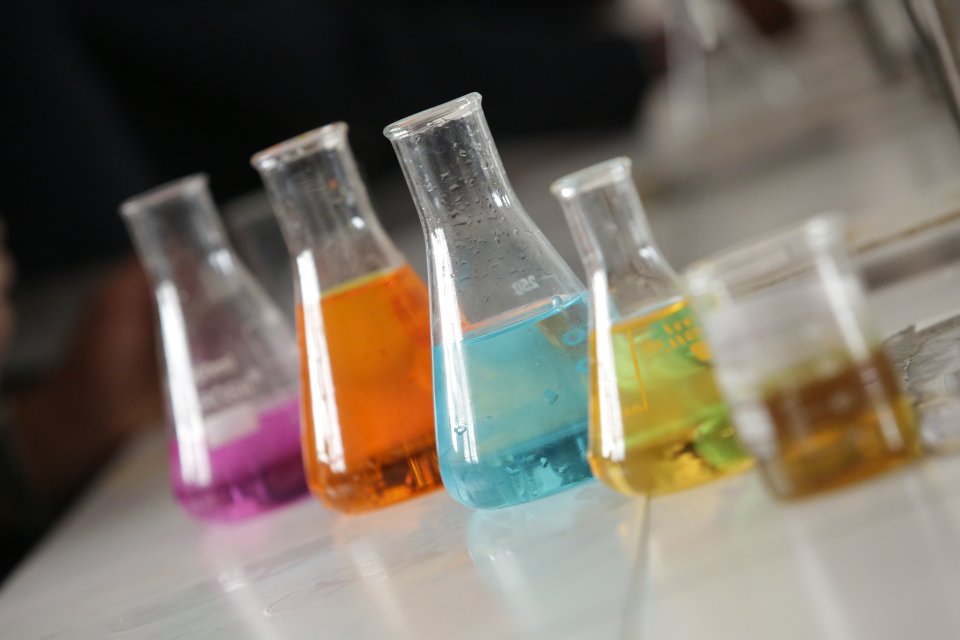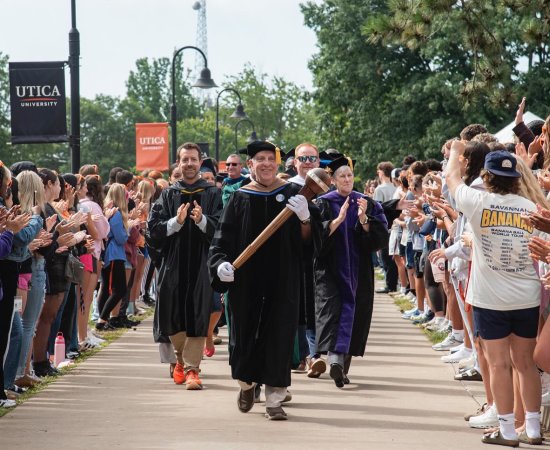
Building Better Clubs Through Chemistry

A new book from a premier science organization features a trio of Utica College faculty lending their expertise.
Released in December 2018, Building and Maintaining Award-Winning ACS Student Members Chapters, Volume III is the latest in the Symposium Series, one of the flagship book series from the American Chemical Society.
Based on the recognition that the department’s Chemistry Club at Utica College has earned at the national level with the American Chemical Society (ACS), the trio of chemistry experts was invited by the ACS to submit a book chapter proposal for the Symposium Series.
Founded in 1876 and chartered by the U.S. Congress, the American Chemical Society is the world’s largest scientific society. Their mission is to advance the broader chemistry enterprise and its practitioners for the benefit of Earth and its people with a vision to improve people’s lives through the transforming power of chemistry.
Among the Society’s more than 50 publications, the ACS Symposium Series, are the high-quality, peer-reviewed eBooks developed from ACS technical divisions' symposia. Each chapter is carefully authored by an expert in the field, and the collection of chapters edited by an internationally recognized leader in the field. The series covers a broad range of topics including agricultural and food chemistry, cellulose and renewable materials, chemical education, organic chemistry, polymer chemistry, materials, and many others.
The team submitted their proposal, which explained that their approach to Club chapter success is to use their Chemistry Club as an integrated teaching tool for Utica College chemistry majors to experience.
What does it mean to be a member of a chemical community? What is the responsibility of a chemist in today’s society? How does a chemist approach a problem or try to answer questions - what makes their viewpoint unique and useful?
The experiences for chemistry majors gained with Chemistry Club helps students answer those questions for themselves. And it’s those experiences that help contribute to the Utica College Chemistry Club’s ongoing success both locally and nationally.
“Essentially, our chapter proposal outline our take, as a department, on how we use the Chemistry Club to help reinforce our learning goals in the department, and how we blend our majors experience with our Club experience to the benefit of both groups, Dr. Boucher explains. “We are all about training chemists and biochemists. A student can, and many do, go out into the real world with a B.S. in chemistry and become professional bench chemists. So, our major focuses on how to help students grow into functioning professional chemists, helping them to ‘think like a chemist,’ ‘work like a chemist,’ and ‘communicate like a chemist.’ Those are the three cornerstones of our major curriculum.”
A very selective process, the chapter proposal put forth by the UC team, with only a few weeks to do so, went through two rounds of blind peer review before acceptance. The team was then given one month to write and submit the full chapter with reviews and revision requests coming from the ACS nearly two months later. Some minor revisions over the course of two weeks had the team re-submitting in early June with an acceptance notice for their full chapter in early July.
“While the writing happened quickly, it reflects work done in the department over many, many years!” Dr. Boucher says.
Within this third volume of the highly-popular series is the chapter titled “Learning through teaching and growth through service: Integrating the chemistry club experience throughout the academic major” co-authored by Utica College Professor of Chemistry Dr. Michelle Boucher, Associate Professor of Chemistry Dr. Alyssa Thomas, and Professor Chemistry Dr. Curtis Pulliam.
“We, in the chemical education field, find equal value in the education that happens outside of the formal classroom or laboratory, and certainly understand the value of introduction to professional behavior (and professional societies like ACS), but it is less-often talked about,” says Dr. Boucher. “I was excited to be given a venue to talk about what we do, why we do it, and why we have found it successful.”
The book looks at what the common threads may be that help to not only build, but maintain first-class American Chemical Society Student Member Chapters. Capturing the many voices of those in the Society who have formed award-winning Student Member Chapters, along with those who have kept them going beyond their formation, the book is a recipe for building and maintaining the greatest Student Member Chapters of ACS as possible.
Reactivated in 2005 as a Student Chapter of the American Chemical Society, the Utica College Chemistry Club, with the ACS affiliation/recognition then had access to all the resources offered by the society, of which Dr. Boucher says, there are plenty.
“Having those resources allowed us to take our Chemistry Club into a more professional-development route, which naturally led to it being integrated into our Senior Seminar experience (which is in part a professional development-focused course), says Dr. Boucher. “We started assessing the usefulness of what is essentially a symbiotic relationship between Chemistry Club and our majors-experience courses. They each contribute to the success of the other, and they each are improved through the work with the other. My approach to chemical education fits very well with the approach the department has already established. I too, focus on a molecular worldview and on the value of hands-on experiences as a method to help students think like chemists by actually functioning as chemists, using the instrumentation that chemists use, solving problems that chemists tackle - learning by doing.”
Through chemical outreach, having a venue to communicate chemistry, student mentorship, and professional development opportunities, the UC faculty work with Chemistry Club to reinforce those cornerstones.
As undergraduate educators, Dr. Boucher says she and fellow faculty need to help students often fresh out of high school train in just four years to become chemists who can go out into the world and making a living as working chemists.
“Being a chemist is much more than just learning a bunch of math and formulas; chemists are responsible for so much of what we use and need in today’s world,” Dr. Boucher says. “From the vitamins and Claritin you take in the morning, to the formulation of the fuel for your car, to the bouncy rubber soles of your shoes, to the silky smooth hair fresh from a wash, to the lovely colors on your smartphone screen, a chemist made that, measured that to determine safety and proper formulation, design that, predicted that, and analyzed that.”
And it’s the results of this work that affects the world we all live in, every day. As Dr. Pulliam puts it, the work of chemists finding molecules, making molecules, and counting molecules is done to feed people, keep people warm and safe, and keep them well.
“Chemists develop new ways to make the fertilizers we need for an overcrowded planet; make new, better, more environmentally friendly pesticides and herbicides to protect crops; and find ways to keep foodstuffs from spoiling and better ways to transport fresh food are all working to feed people,” Dr. Pulliam explains. “Chemists work in the energy fields, both traditional (non-renewable) and in developing renewable energy areas; they make new fabrics to clothe and protect; and make building materials for houses, all working to keep people warm.”
Every facet of daily life is impacted by the work of chemists, who also find and develop new medicines and find ways to make them in sufficient quantities to meet the needs of society.
“They produce ways to deliver clean, safe water to a world where clean water is becoming harder to find; and clean up mistakes made in the past that affect our soil, water, and air are all working to keep people well,” Dr. Pulliam says. “They do this by making molecules, finding molecules, and counting molecules.”
More Stories


High spirits, community kick-off 2025 Utica University Convocation

Rainy skies met with showers of smiles at Utica University Move-In Day
I would like to see logins and resources for:
For a general list of frequently used logins, you can also visit our logins page.
